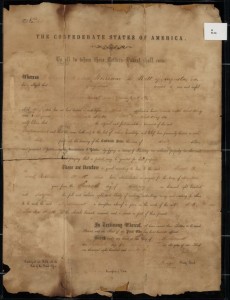
We are pleased to announce a new collection from our partners at the Augusta-Richmond County Public Library System.
The new collection, the Augusta-Richmond County Public Library System Collection, includes photographs from the Augusta flood of 1888, nineteenth century stereographs, a 1922 Augusta Motor Club travel guide, and Confederate States Patent No. 60.
Digitization of the collection was made possible by the DPLA’s Public Library Partnerships Project (PLPP), where DPLA service hubs like the DLG collaborate with Georgia public libraries to make their special collections materials accessible to a broader audience online.
The Augusta-Richmond County Public Library System serves Augusta-Richmond County and the Central Savannah River Area, including South Carolina. The headquarters library is located in downtown Augusta, Georgia and serves the central business district. In addition, five branch libraries serve the outlying areas, neighborhoods, and districts which surround the city center; Wallace Branch, Friedman Branch, Appleby Branch, Maxwell Branch, and Diamond Lakes Branch.
Tina Monaco, the historian of the Georgia Heritage Room of the Augusta-Richmond County Public Library, comments on the strengths of the Augusta-Richmond County Public Library System collection: “As Augusta is the second oldest city in Georgia, it has a rich history, so having resources available and accessible to the public through the library for the study of history is a benefit for all. Because the Georgia Heritage Room has an extensive collection of print resources and materials on local and Georgia history, as well as genealogy we expand the reach of the library to out-of-town scholars, and family researchers, therefore broadening our purpose.”
The image shown in this post, Confederate States Patent #60, was granted to Jacob B. and William L. Platt of Augusta, Georgia on January 7, 1872 for “Camp Cots.” The invention claimed to be a “new and improved universal cot for camp and hospital purposes” which could be “folded or rolled up into a small space when transported from place to place.”
We hope that you take the time to look through these new resources made available through our partnership with the Augusta-Richmond County Public Library System. Let us know what you think!

